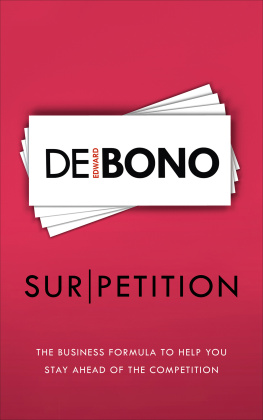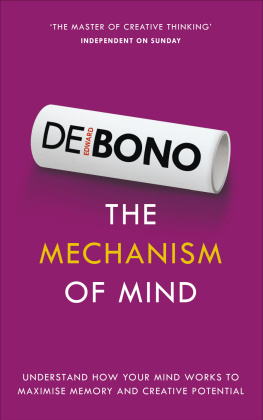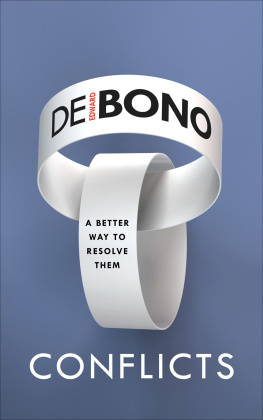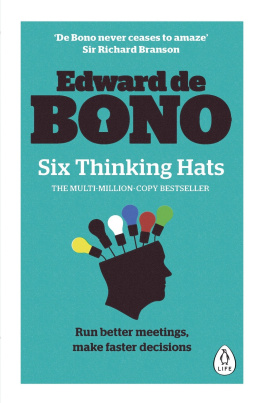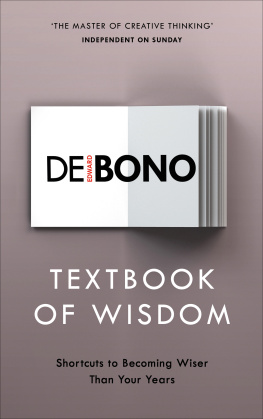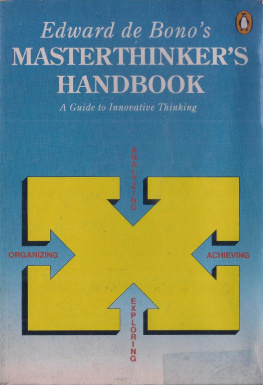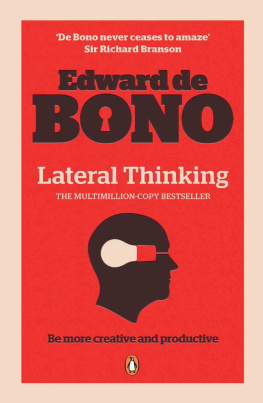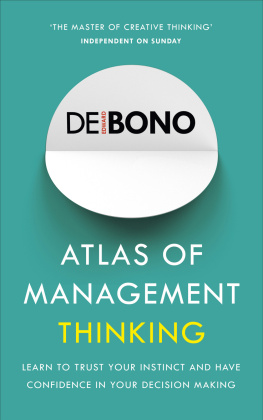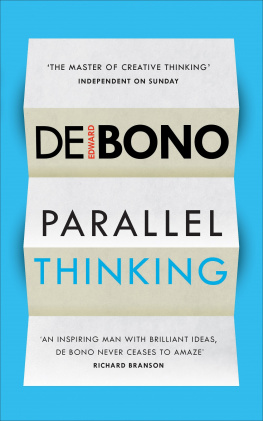
SUR|PETITION
THE NEW BUSINESS FORMULA TO HELP YOU STAY A HEAD OF THE COMPETITION
Edward de Bono

CONTENTS
ABOUT THE AUTHOR
Edward de Bono is the leading authority in the field of creative thinking and originator of the term lateral thinking and the Six Thinking Hats. Highly regarded internationally, his instruction has been sought by governments, schools and leading corporations around the world.
De Bonos thinking methods provide practical, creative tools to make it possible for anyone not just people considered arty to be creative on demand. These are based on an understanding of the logic of the brains self-organizing information system, which forms asymmetric patterns. This is why creative thinking can be seen as a formal and deliberate skill and not a mysterious talent. De Bonos system of lateral thinking is so powerful that the use of just one of his methods produced 21,000 ideas in a single afternoon at a workshop with a steel company.
In the Middle Ages the influence of the Church gave rise to good thinking for finding the truth, which in turn served us well in science. Edward de Bono believes this is ebne (excellent but not enough). Culturally, we have never developed thinking for creating value but it is now time we treated it much more seriously. As part of this initiative Edward de Bono has taught thinking directly in schools and his methods are in use in thousands of schools worldwide. Research has shown improvement in all subjects, increased employment and much-reduced criminal behaviour.
Edward de Bono holds an MD (Malta), MA (Oxford), DPhil (Oxford), PhD (Cambridge) and DDes (RMIT). He has had faculty appointments at the universities of Oxford, Cambridge, London and Harvard, and was a Rhodes Scholar at Oxford. He has written 83 books, translated into 42 languages, in the field of creativity and thinking, including the global bestsellers Six Thinking Hats and Lateral Thinking.
EDITORS NOTE
Edward de Bono is the leading authority in the field of creative thinking and the publishers are delighted to be bringing this thought-provoking work back into print.
The author was writing in a different political and social era, and many of the examples he cites offer a snapshot of this time. However, though there have been considerable changes politically, socially and economically over the last 30 years or so, this important book explores key issues which still require attention, even in todays fast-paced world, and many parallels can be drawn with life today. The fundamental principles and themes in this book will encourage us to change the way we think; as the author himself says, In a rapidly changing world we are finding that our thinking is inadequate to meet the demands put on it.
Edward de Bonos teaching is as valid today as when this book was first published, and will resonate with readers for many years to come.
INTRODUCTION
In this book I wish to show that the notion of competition is a dangerous and seductive trap that limits and restricts business thinking. Anyone involved in running a business needs to move beyond competition to sur|petition.
Competition is a fashionable concept vigorously pushed by such gurus as Michael Porter of the Harvard Business School. But any business school has to be about ten years behind the times in its thinking in order to be credible. This is true because its ideas have to be immediately acceptable; since there is a considerable time lag, the ideas of the future are not instantly acceptable. Therefore, such concepts do not necessarily enhance a schools reputation.
We all know about the global marketplace and that in order to survive you must be competitive. You must be able to compete with the Japanese, the Germans and the Chinese. If you cannot compete, you do not survive. So what is wrong with competition?
The paradox is that you cannot truly be competitive if you seek to be competitive.
The key word here is survive. It is, of course, perfectly true that you must be competitive in order to survive. Giant retailers like Sears have to cut their costs considerably to be able to survive against other retailers such as Wal-Mart with its advanced computer systems and high sales per square foot. If your costs and values are out of line, you may cease to survive.
But any organization that plans just to survive will sooner or later find itself out of business. Only those organizations that plan for success will survive, while those that plan only to survive will fail.
So competition is important as part of the baseline for survival.
Picture an exotic garden outside Manila in the Philippines. A scented summer evening provides the perfect setting for a gourmet banquet for the Chevaliers du Tastevin. Flaming torches are set among the bushes. Costumed waiters carry in the first dish of shellfish on their heads. Then follows clear soup in large earthenware bowls. Everyone, myself included, starts to spoon up the soup. It is very clear soup indeed. In fact it is not soup at all. It is plain water served in rather large finger bowls for rinsing the fingers after the shellfish dish. The mistake is understandable.
Water is necessary for soup but soup has to be more than water.
In the same way there are many things that are necessary, but not sufficient, for business to survive (for example, cost control), just like water for the soup. Competition is one of the things that is necessary for business to survive, but it is not sufficient. A serious mistake that many executives make is to believe that competition is the key to success. It is not. Competition is merely part of the baseline of survival. Success requires going beyond competition to sur|petition.
Sur|petition
There is a serious overcapacity of about 25 percent in European car production. At one time I was giving a seminar for the British marketing department of Ford, the biggest Ford operation outside of Detroit. We were discussing competing in the European market.
I suggested that Ford should buy up a company called NCP (National Car Parks), which owned most of the car parks in city centers throughout the United Kingdom. If NCP became a Ford company, a notice could be placed at the entrance to all city center car parks indicating that only Ford cars could use them.
A car, I argued, is no longer just a lump of engineering. If your neighbor boasts that his lump of engineering is better than your lump of engineering, you can point out that you can park in the city, and he cannot. The ability to park is very much part of the integrated value of a car if you have to drive in a city. So is the ability to resell the car, have it serviced, and have it insured.
I have been told, for instance, that it is impossible to insure a Mercedes or a BMW if you live in the Bronx in New York. It does not matter how good the engineering may be; if you cannot insure a car, you will probably not buy it.
Of course, Ford did not take up my idea. They said that as an engineering company, it was not their business to buy up car parks. In the future, some entrepreneurs probably will buy up or build car parks and then get the Koreans to make private-label cars for them. They will sell, park, insure and resell cars. Manufacturing will only be a service to this profit center, and the manufacturing margins will be squeezed.
Next page
